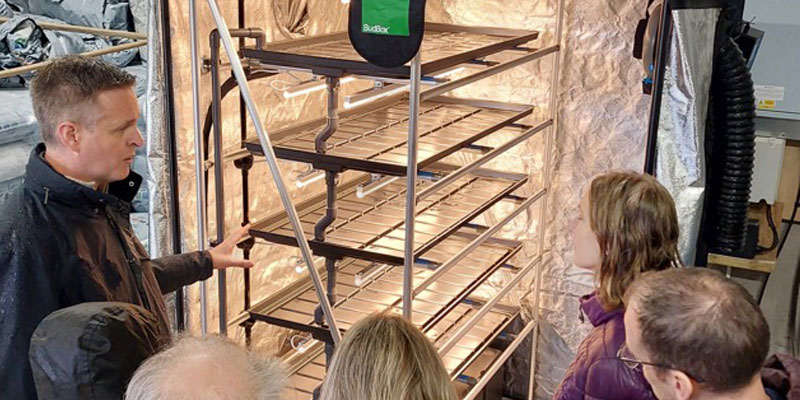Developing a novel circular model for low-emission, healthy food production
The Biorenewables Development Centre, Kilnsey Park Estate and the Centre for Novel Agricultural Products have won funding from Innovate UK to develop a novel circular model for food production to produce resource-efficient, healthy and low-emission food such as leafy salads and vegetables.

The UK currently imports 46% of its food needs; this collaboration will help address the most serious threat to food shortages, such as relying on long supply chains that are vulnerable to disruption from external factors such as droughts and transport blockades.
The two-year collaboration will drive the growth of world-leading Total Controlled Environment Agriculture (TCEA) capacity (or more commonly known as indoor vertical farming) in the UK by creating and testing a new circular and scalable model for local low-emission food production, by optimising TCEA production technologies to reduce running costs and improve productivity, and by developing a nutrient-rich biofertiliser that grows healthy, high nutrition food.
Jamie Roberts, Managing Partner, Kilnsey Park Estate said: “We are delighted to be part of this collaboration and host the containerised food production facility at our Kilnsey Park Estate in the Yorkshire Dales.
"We pride ourselves on being one of the greenest, most environmentally friendly visitor attractions in the UK. The facility will be powered by renewable energy including solar power and for the first time biogas from anaerobic digestion to achieve a projected 30% reduction in emissions.”
Dr Deborah Rathbone, Bioscience Innovation Team Lead, Biorenewables Development Centre added: "At the Biorenewables Development Centre we will apply our expertise in anaerobic digestion and plant growth trials.
"Our Bioscience Innovation Technologists will increase the productivity of TCEA through a number of innovations, including developing a nutrient-rich biofertiliser using anaerobic digestion to produce a low-cost, lower-emission alternative to commercial fertilisers. Whereas our Business Development Managers will map feedstocks for biofertiliser production, assist in the LCA and TEA to ensure the successful delivery of project objectives."
The partners will also optimise TCEA efficiency by testing different production methods - including growing system technologies and substrates such as wool - in order to maximise the sustainability and nutritional value of the food produced.
Katherine Denby, Professor of Sustainable Crop Production, Centre for Novel Agricultural Products, explained: "Being part of this collaboration will enable us to expand our research on optimising the environmental footprint of vertical farming, and apply our expertise in improving the production and nutritional quality of horticultural crops in a real-world setting at Kilnsey Park Estate."
The expected impacts of this collaboration are to develop a genuinely circular food production system that emphasises sustainable local production to achieve shorter, less centralised and decarbonised supply chains whilst contributing to Net Zero targets.
Contact us
Centre for Novel Agricultural Products
cnap@york.ac.uk
+44 (0)1904 328776
Department of Biology,
University of York,
Wentworth Way,
York
YO10 5DD
Related links
Contact us
Centre for Novel Agricultural Products
cnap@york.ac.uk
+44 (0)1904 328776
Department of Biology,
University of York,
Wentworth Way,
York
YO10 5DD